A deft and well-plotted procedural with a time travel twist, Lee Soo-yeon’s Grid is as intelligent and thoughtful as all her dramas. But its commitment to its own ambiguity means some viewers won’t be able to connect with it.
When one of Korea’s best writers, Lee Soo-yeon (Forest of Secrets, Life), announced she wanted to branch out into science fiction, there was a lot of scepticism and a hefty chunk of optimistic enthusiasm.
Forest of Secrets 1&2 (otherwise known as Stranger) are widely considered some of Korea’s best dramas: tightly plotted, thematically strong and with thoughtful and intelligent dialogue. Lee Soo-yeon’s writing is gripping in only the best way; pulling you in and taking you on a journey with characters you end up caring about and frequently coming out the other side upended in a way you didn’t expect.
Traditionally concerned with systemic social problems like corruption and the warping power of money and hierarchies, Lee Soo-yeon’s writing shines a light on Korean society in a way that feels universal. And while on paper Grid seems like a twisty-turny metaphysical ride of time travel shenanigans, it is no exception.
Who benefits from disasters? What collateral damage are you willing to accept in the name of the greater good? How does that interplay between social benefit and existing power structures shape the world we live in? And given the choice between your own comfort and a better society for all, what would you choose?
Grid is here to ask those very questions. But not to answer them. And how you feel about that will affect how you feel about the show.
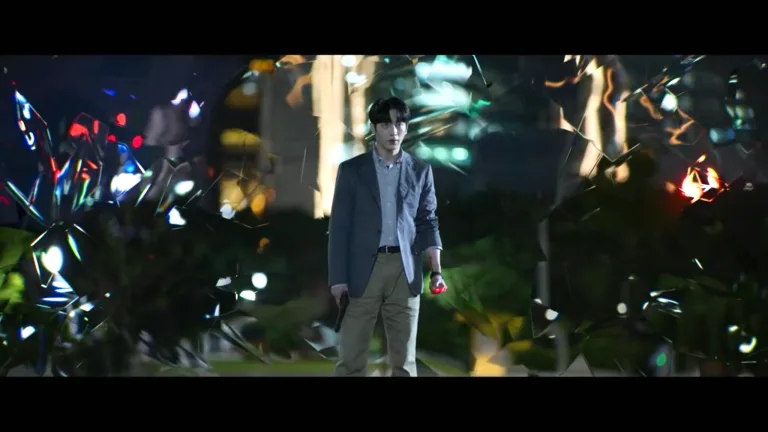
The Plot
It’s 2021 and Earth is being buffeted by solar winds while being protected by a global Grid that scatters the radiation before it can hit Earth. The Grid is flawed though, requiring constant maintenance and updates and still allowing some radiation to pass through. The Grid is an anachronism also; only existing because of the temporal intervention of a woman dubbed The Ghost (Lee Si-young). She appeared in specific locations in different parts of the globe in 1997, provided the world with the initial first stage calculations, and then disappeared.
Kim Sae-ha (Seo Kang-joon) is a researcher working at the benignly-named Administration Bureau, responsible for the Grid. He is part of a small team tasked with finding The Ghost. But why he wants to find the Ghost and what he and the rest of the Administration Bureau want with her is unclear and only revealed as the show progresses.
After a murder in a convenience store by the violent Kim Ma-nok (Kim Sung-kyun), he joins police investigator Jung Sae-byeok (Kim Ah-joong) in a search for the mysterious woman who can appear and disappear at will but is for some reason helping Ma-nok to evade the police. As they get closer to the Ghost and her secrets, they have to dodge the eagle-eyed attention of the other members of the Administrative Bureau: hard-nosed director, Choi Seon-wool (Jang So-wool) and Sae-byeok’s ex-husband, Song Eo-jin (Kim Mu-yeol). All of whom have their own agendas for wanting to find the mysterious woman.
Who is the Ghost? Is she really a time traveller? Why would she save humanity but protect a murderer? What does she want? Why does she do what she does? These are all questions that motivate our characters but, as with most quests for truth, the searcher may find themselves only with disconnected parts of a puzzle and no box to tell them what the image is supposed to be. Like the tail, leg and trunk of an elephant in the famous allegory. But in Grid, it’s not just our characters who are the blind men. The audience is too.
One thing that characterises Grid’s unfolding, increasingly messy, plot is the writer’s stated commitment to not providing exposition. It’s clear she believes that what’s on screen speaks for itself. I’m inclined to agree but, then, I’m a motivated viewer who’s seen it twice. Casual viewers have a different opinion, at least judging from some of the reviews.
There’s certainly a blink-and-you’ll-miss-it quality to most of the answers and many are left to our imaginations. If Grid had been created with standard Kdrama episode lengths or had been spread over two seasons, it may have allowed the story and the characters to breathe a bit more. Which brings us to the main criticism of the drama: that its procedural nature and back half time travel chaos detract from its emotional, human component. And with humanity front and centre of the show’s themes, it’s what could have propelled Grid from being a good drama into being a great drama.
The show’s frenetic pace means that, for example, Sae-ha’s decision to blow up his privileged life of comfort and sacrifice himself for the rest of humanity is not given the time and space it needed to connect with viewers. And yet the complex butterfly-wing necessity of this sacrifice is what makes it so poignant. Sae-ha was unimportant to recorded history: his life and death an unremarked footnote. But it mattered to Sae-byeok and that was enough to change the whole world.

A science fiction procedural
If there’s one thing Lee Soo-yeon is famous for, it’s her procedural writing. Hooking the audience into an investigation and keeping them invested through the twists and turns of an investigation is her bread and butter and Grid is no exception. Viewers with experience watching science fiction were no doubt surprised to find themselves initially watching a crime procedural but it makes a lot of sense with the writer’s background.
And to say that she is good at this, is an understatement. She is the master at this. And taking us into the story from a grounded place like a murder investigation allows us to connect with our lead characters as ordinary (albeit extremely proficient) people who are caught by surprise as the case they’re on takes a decidedly weird turn.
The procedural elements give Grid’s dystopia a nice sense of the workaday, bureaucratic busy work that makes most societies function. The whole world may be one failing component away from irradiation but people still have to go to work, eat, sleep, take care of relatives, get married, divorced and get paperwork done. Life remains ordinary even with the imminent threat of mass devastation. You may be investigating a teleporting enigma who never ages and whose DNA is fundamentally warped but you still want to go home on time.
Regardless of anything else, the procedural aspects of the show are extremely well written and will suck you in and keep you invested. You’ll find yourself halfway through before you can even say “grandfather paradox”. And you’ll probably need to, unless you are convinced by my argument that the multiverse theory of time travel is at play.
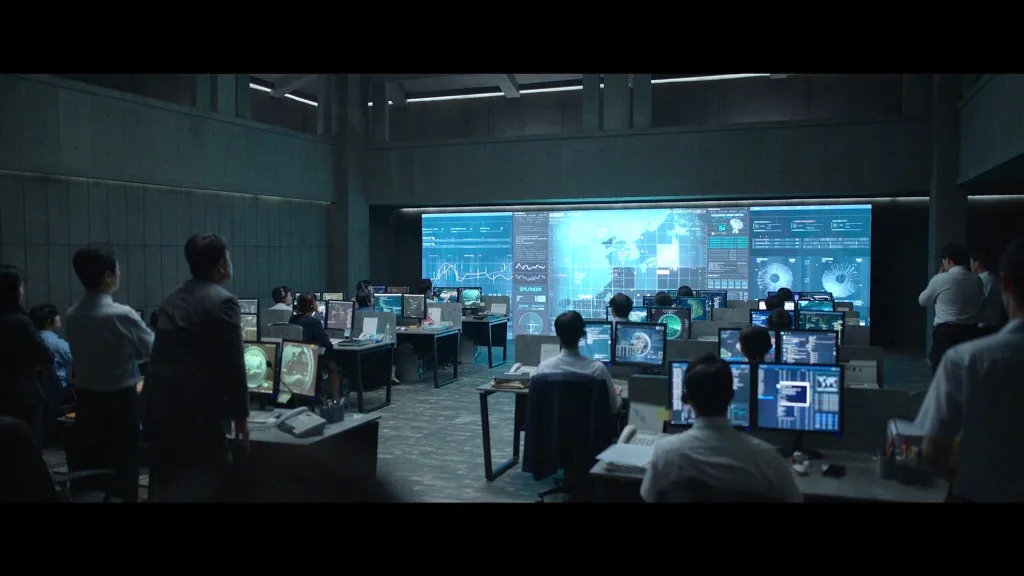
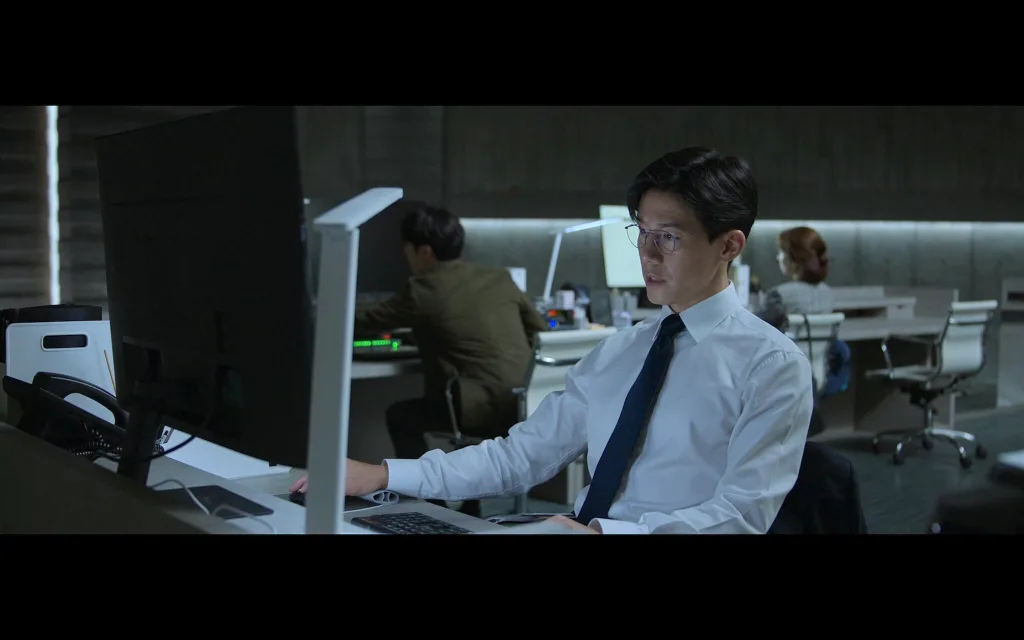
For the greater good
As Grid unfolds, we start to understand what motivates the search for the Ghost: both for our two main leads but also for the other staff at the Administration Bureau and of the organisation itself. And as we do, a larger question arises around sacrifices made for the greater good.
Like most kdrama leads, Sae-ha has had a tragic life. His father was murdered by the Ghost on that night in 1997. Tortured by her husband’s death, his mother eventually tried to kill herself before being seriously injured in a factory fire when the Grid nearly failed in 2004. But Sea-ha’s father wasn’t the only one who died that night. A janitor was also murdered in front of his foster son; a young boy who grew up to be the angry, violent Ma-nok. In fact, the impact of that night flows through time in more ways than just the existence of the Grid itself.
The way that the past creates the future is in some ways infinitely subtle. Sae-ha wouldn’t have joined the Administration Bureau if not for his father’s death. And it’s only one way in which our characters have ended up where they are.
The Grid saved millions, billions even. But was it worth the sacrifice? And was that sacrifice necessary or merely expedient? Were Sae-ha and Ma-nok’s fathers merely cogs in a machine greater than themselves? And if so, who runs that machine? Who has power over it?
As Grid moves along, we begin to see that the quest for the Ghost is ultimately about power. Sae-ha wants to rewrite the past. His colleagues merely want answers. But the Administration Bureau itself wants something else: institutional power. It wants to control technology that it doesn’t yet have. It wants time travel simply to possess time travel. And it’s willing to do anything to get it.
Power, control and social disparity
In episode 7 of Grid, Sae-ha does gets control of the Ghost’s time travel technology. Believing he can fix everything, he heads back to 1997 to ensure the construction of the Grid while not sacrificing any lives. He fails repeatedly, going through the events over and over again and failing each time. In doing so he finally realises one thing about the Ghost: she was never uncaring nor arbitrary but also tried as hard as he did to ensure the future with as few sacrifices as possible.
Sae-ha’s interventions accidentally result in a world where the Ghost is never born. She can therefore never come back in time to start the Grid programme. After watching the Ghost dissolve before his eyes, Sae-ha returns to the future and is absorbed into a timeline where the Grid was never built. It’s a world blighted by radiation poisoning but one where he finds himself suddenly in a position of privilege and power. He’s created a world where the majority struggles but his own family’s fortunes are ascendant: built on the back of a treatment for symptoms that used to have a cure.
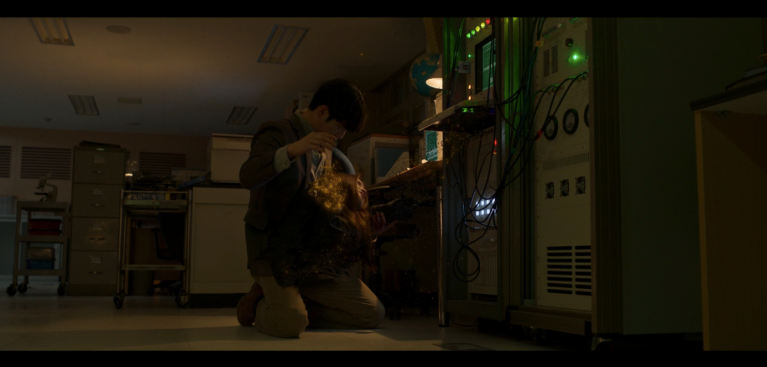
If power in Grid is represented by time travel, then whoever has that power can choose to create a world where benefits are hoarded by a select few or spread more evenly. Sae-ha can continue to live in a world of wealth with his loving, living parents or he can sacrifice that for the greater good.
The message of Grid-less world has another, broader message though. It’s that some would choose a world blighted by disaster where they could make their own fortunes over a world where people could live in peace and relative, generalised prosperity. There are those who would choose to burn the world down if it was in their own short-term interests. For some, the Grid is not salvation but an obstacle in their path to personal enrichment.
And if there is one theme we can identify with, it’s this one. In a world of catastrophic climatic change or even just the current pandemic, there will be forces who will choose their own short-term wealth and power – even just their own comfort – over what’s best for everybody.
Sae-ha’s experience in the new timeline is the age-old story of privilege coming slowly to the realisation that the comfort and ease of his own life is built on the suffering of others. It’s the same journey as those of us who grew up comfortable in a colonising country. What you have by birth was taken from others. It’s as rude an awakening for us as it is for Sae-ha.
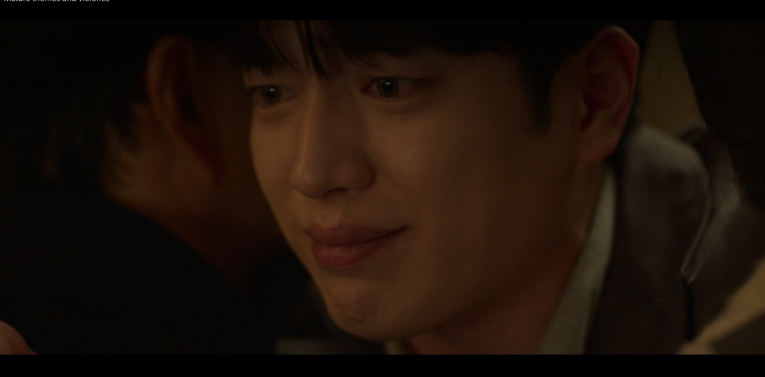
Sae-ha’s decision to travel back and restore the timeline is a powerful one and yet the show’s pace and tone mean much of this emotional resonance is lost. The writer’s commitment to ambiguity also means that we are now the outsiders looking in on his behaviour and trying to divine his motivations as he comes to the past with a new agenda.
The first – to make sure the Grid is built even if it means his own father’s death – are self-evident. But the other – to prepare for his own necessary death by ensuring his mother is healthy and doesn’t need his full-time care – is more opaque.
It’s only one of the ways that the show’s intellectual and procedural tone, and its short episodes and truncated storytelling, removed the pathos from what should have been an intensely human story.
In the same way, Sae-byeok’s grief-stricken decision to sleep with her ex-husband – an act that leads to the Ghost’s existence – seemingly came out of nowhere. So little time was spent on that relationship that her turning to him in that moment was more of a surprise than a culmination. If anything, I’d have easier believed she was pregnant to Sae-ha than that she would sleep with Eo-jin. As it connects the dots across the timeline, it makes sense temporally. But the human element is missing, as it is from much of the drama.
A Matter of Perspective
In my piece on Grid’s time travel, I talk about the way in which the show’s plot is seen from the perspective of our protagonists but the narrative itself is told from the Ghost’s perspective. This creates a sense of disconnection from the narrative as our lead characters are on the outside trying to discover the truth behind the Ghost and her actions.
As they follow the breadcrumbs the Ghost leaves behind, they are slowly shading in the edges of the unfolding story but – at least until Sae-he himself takes the time travel technology for his own use – are merely observers of it. As we are.
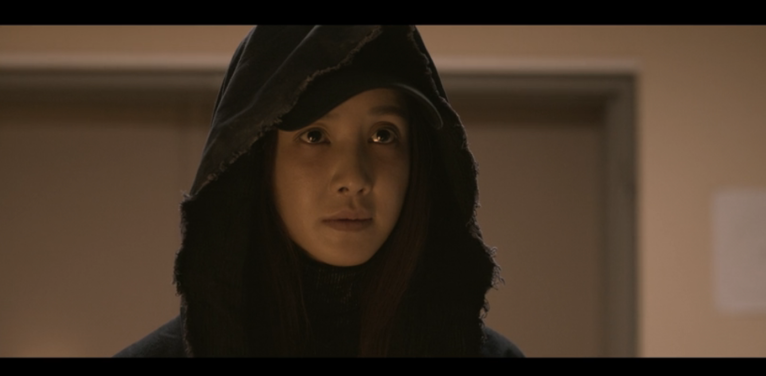
The Ghost is in many ways an unknowable natural force. Bound by laws we don’t know or understand, responding to events we can’t perceive. Like the solar winds themselves. We can merely grope best as we can towards some kind of understanding as forces beyond our control, even our capacity for perception, shape the world we live in.
What does the Ghost want? What is she trying to achieve? When you watch Grid, you may expect to get these answers but all you can see is her affect on the world and the way it is shaped by her seemingly random interventions. In many ways, our characters’ search for the Ghost is the age-old search for meaning in a universe so complex that all we see is a glass half darkly.
This perspective issue becomes more and more important in the later episodes, as other time travellers come into play: all working towards their own agendas and all trying to create their preferred future. But with each traveler being absorbed into the new timeline once they return to their destination point – and with each of these destination points being at different points in spacetime – it becomes almost impossible to see what changes each of them are responding to in their own emerging realities.
Sae-ha himself creates several alternative timelines, eventually travelling back from one with a version of Sae-byeok who remembers a different history of the show’s plot that we didn’t get to see. She and other characters then begin to act in ways that are motivated by events that we as the audience never experienced and can’t know.
By the end of Grid, the Ghost herself is in the same position as the rest of us as time travellers from a possible future begin to change the timeline for agendas she can’t see and therefore can’t predict.
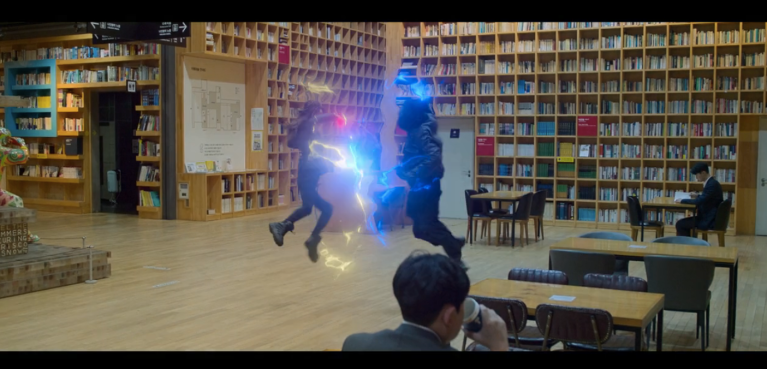
Like Sae-ha and even the Ghost herself, we may finally grasp some measure of control through technology only to realise our discovery is merely the knowledge of our own ignorance. What we know therefore becomes the knowledge of our lack of knowledge. That the universe is vaster and even more unknowable than we realised. And any sense of control is merely an illusion.
But should Grid have left its audience with this same feeling? A gnawing confused sense of their own ignorance in the face of reactions to actions they can never see nor understand? Watching Grid then becomes somewhat equivalent to watching a game of chess arbitrated by someone who flatly refuses to explain the rules. Or possibly like watching a murder mystery where all we have are red herrings and then halfway through somebody mentions there may not have been a murder at all. Which leaves us with a whole lot of procedural investigation of what is then deemed unimportant.
If nothing you do matters, then the only thing that matters is what you do.
Angel in Angel, quoting 19th century existentialism. Kind of.
Like the characters in Grid, we also live in a world shaped by the interlocking webs of a vast network of natural forces, actions, reactions and motivations seemingly beyond our knowledge or control. We can search desperately for meaning as best we can and try to take control as much as possible, but in the end we’re just pieces in a giant whole that’s infinitely complex and frequently without purpose. And ultimately all we can control is our own actions.
It’s a bold choice by a bold writer. And while it gives the show a somewhat metaphysical poignancy in a world where we are bombarded by information that we frequently don’t have the capacity to interpret or understand, some viewers were no doubt put off by her commitment to not giving any real answers.
Ultimately, what we do with that existentially disquieting knowledge is up to us. It says something that what Sae-ha did with that knowledge was surrender to fate in the belief that something better would come from his sacrifice. Given the choice between a more comfortable future for himself and his loved ones or a more comfortable future for the human race, he chose the latter.
And if we take any message away from Grid it’s that. Your life may not make the history books but if it changes at least one person then it can change the world.
The Ending that wasn’t
There is a nexus point in the final episode of Grid. A singular moment that defines the scope of the future timeline. It’s a moment of violence that involves Ma-nok, Sae-beyok and Sae-ha.
Sae-byeok dies and the potentiality of The Ghost dies with her. The Grid never exists or perhaps was invented much later. Alternatively, Sae-ha dies as the culmination of events that started with the Ghost’s actions on that night in 1997. In her grief, Sae-byeok turns to her ex for comfort, gets pregnant and gives birth to the Ghost’s mother (or possibly grandmother). The Ghost travels back in time to build the Grid.
Both time loops are paradoxes that may or may not be resolved by the expanding block theory or the multiverse theory of time travel as I speculate in my piece on the time travel in Grid And yet these two possible outcomes are not the only two.
Ma-nok lives, Ma-nok dies. The Ghost lives. The Ghost dies. The Grid is built. The Grid never exists. The Grid is built but something has changed and we don’t know what.
At this nexus point, time travellers begin to gather. But, like the Ghost, who they are and what they want is unknowable. Somewhere in a future we cannot see, probably in worlds we cannot access, events ripple across time to create outcomes that benefit somebody. But who? And how? We don’t know, can’t know.
Mysterious forces begin to jockey for control in the Administration Bureau. The grid looks as though it may fail or even never exist. It’s impossible to say who won the battle for control of the timeline or even if there’s a definitive version of the timeline that we could default to.
A new antagonist is created: a new Ghost-like figure who seems committed to a world without the Grid. He stands over what appears to be the Ghost’s dead body while in a house somewhere, Eo-jin, Sae-byeok and their daughter find versions of the Ghost and Sae-ha still alive and ready to fight back.
Grid therefore does not end, a fact that our new Ghost notes in our final piece of dialogue.
It’s possible the show was angling for a second season. But since none has eventuated and the writer seems to have moved on, then it appears Grid really was supposed to be a self-contained story. One with no ending but an ongoing struggle to save as many people as possible from disaster while vested interests are stacked against you.
And written out like that, it sends a powerful message about the current state of the world. But I can’t say it’s entirely satisfying.
Does anyone know the truth? Is there ever really an end?
Mystery man
Good question.
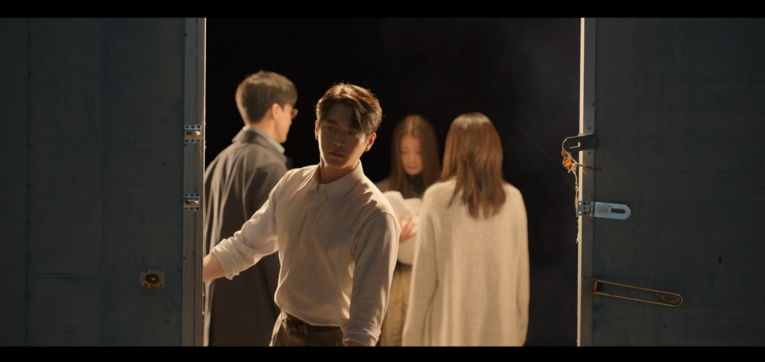
Grid is available with full English subtitles on Disney+



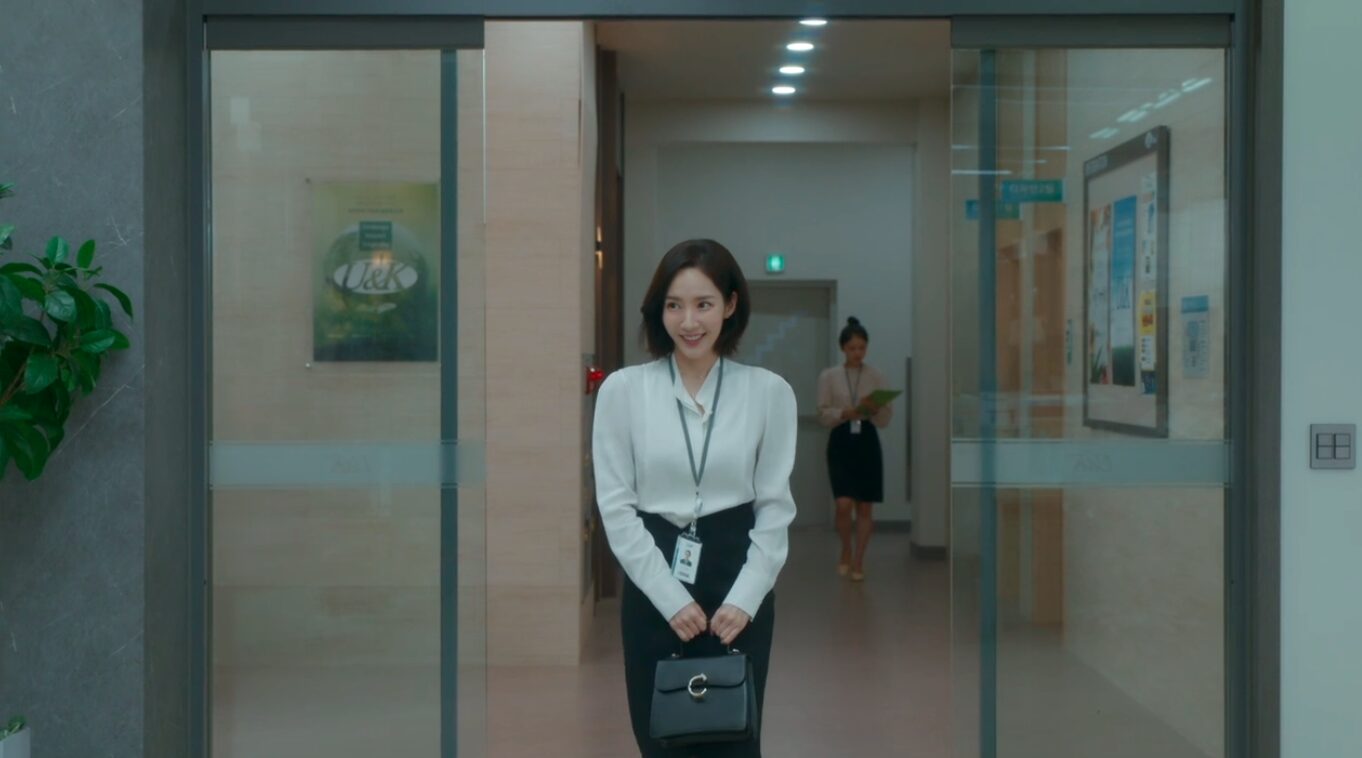
Thank you for writing this, LT. A much appreciated effort at deconstructing this brilliant, yet utterly confusing drama.
I have to agree with you about the lack of focus on the emotional aspect, which made this drama felt a bit too clinical and cold at times. Though, I do wonder at times if that was also a deliberate choice to mimic the cold reality of the world inside the Grid universe. It’s unfortunate because if given enough space, episode 7 and 8 could be an emotionally moving depiction about what it means to be a “hero” within your own capacity. To do the right thing even when no one understood the enormity of your sacrifice. To make the right choice simply because it was the right thing to do. That was such a powerful character moment right there.
By the end of the drama, I couldn’t help feeling this helpless sense of suddenly noticing the vastness of the world, and how insignificant yet wondrous our existence are. Like, we started this tale simply focusing on the lives of these ordinary leads, just as we’ve done in countless previous dramas. And yet, as the tale unfolded, it felt like someone abruptly took off the hood that obstructed my eyes and I was confronted by the fact that all this time I only perused a very narrow field of view to comprehend something so enormous.
As an entertainment, I think Grid should be written more coherently, because ultimately a drama needed to be able to tell its story clearly. But a part of me did think that Writer Lee Soo-yeon included some of her personal epiphany about the state of the world in this tale. And as a vehicle for that particular messages, I think Grid is fine the way it is. Complete with its inability to be concluded and the endless nature of human’s struggle against our inner “evil”.
Oh thanks, gadis!
And yes, clinical and cold are a good way to put it. She is if nothing else an intellectual writer and that dispassionate tone comes through. She’s also very committed to open “the fight goes on” endings. Both seasons of FoS and Life ended that way as well.
Although I really like Grid as it stands I can’t help wondering what it would have looked like if wasn’t funded by Disney and was therefore allowed to have more standard episode lengths. A 12 episode season of episodes around an hour would have given her more space to tease some of these big character moments out.
In particular, as you said, Sae-ha sacrificed almost everything and he didn’t even know why or how his death was necessary to the creation of the Grid. But he did it anyway.
“To do the right thing even when no one understood the enormity of your sacrifice. To make the right choice simply because it was the right thing to do.”
It’s just such a powerful thing.
This review is stunning, I can feel the hours and hours of effort you put into it! Sci-Fi really isn’t my genre, it makes my brain swim, but the ideas underpinning this are really compelling so I hope more people discover it!
Aww, thanks Frabs ❤️
Maybe you’ll develop a love for scifi later in life. I’ll convert you!
I love Circle if that means anything 😆
It feels like a good entry-level Sci-fi
Well then… watch this space 😏
I’m already aware of what you have planned 😂
I may have to get in on it somehow, I haven’t watched the whole thing properly since it aired
Thanks so much for this review.
I was talking just yesterday about how I like open endings when done correctly, and this was just it. I remember when I finished last episode my thought was “I don’t know what have I just watched, but I loved it”, and you have just put words to my feeling.
Now I want to rewatch so badly. I know it will be better.
Oh you’re welcome, Eazal. I’m glad I could finally get it finished!
“I don’t know what have I just watched, but I loved it” 😂😂😂
I think it’s better on rewatch because you spend less time trying to tease out the crazy back half time travel and can concentrate more on the smaller moments. So enjoy!